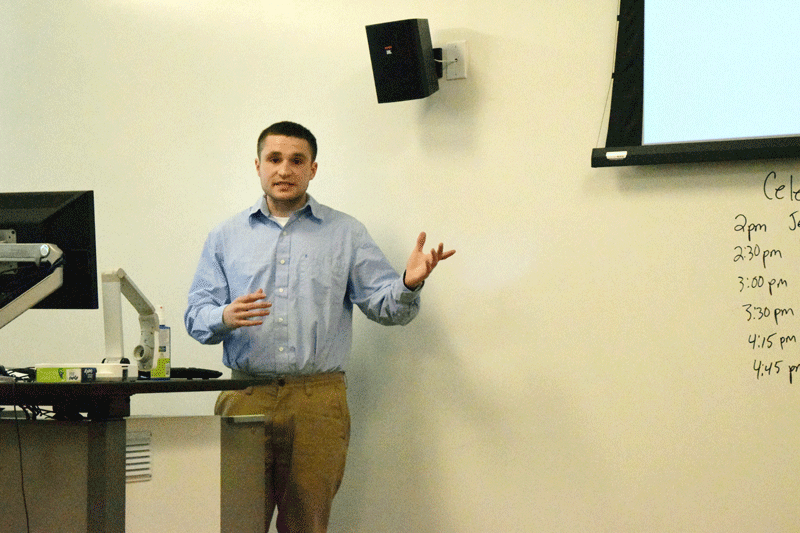Student discusses restoration of felon voting rights
Kevin Lykins gave his presentation on felon voting rights during the Celebration of Student Creativity and Research.
With the Kentucky primary election less than a month away, there is a group of citizens that do not have the right to vote.
The state of Kentucky is one of four states that permanently remove the right to vote from people with felony convictions. Kevin Lykins, a senior political science major, researched this topic as part of the Celebration of Creativity and Research at NKU.
Lykins gave his award-winning report on the topic during oral presentations in Griffin Hall April 14.
“The whole reason I did this research is that Kentucky is one of the four states that permanently disfranchise their felon population,” Lykins said. “In Kentucky, the governor can grant you the right to vote again, but that rarely to never happens.”
One of the driving factors for Lykins to conduct this research was his belief that many young people might know little about the election process due to growing up with parents who have lost their right to vote.
“It’s no secret that your average voter is the older, white male,” Lykins said. “A reason for that could be we have generations of kids growing up in households where they know about voting, but do they know about voting? Maybe their parents can’t vote because they made a bad mistake when they were 19 years old.
“That’s why this research was important to me, because I don’t think a mistake you made as a young adult should haunt you for the rest of your life. Especially a civil liberty that should be granted to all people.”
Lykins’ research set out to determine whether people were aware that felons lost their right to vote and whether people thought that should be the first right lost by someone who had committed a felony.
In his survey, 64 percent of those who took the survey knew that felons no longer had the right to vote in Kentucky. While that didn’t support his theory that people might not know about felon disfranchisement, he said another finding may have explained why.
“Seventy-eight percent of respondents do know that owning a firearm is not permitted after having committed a felony,” Lykins said. “You can draw an idea that maybe the respondents had a good understanding of the criminal justice system and therefore that could be why 64 percent of people knew felons lost their right to vote.”
When those taking the survey were asked if they knew that the loss of the right to vote was permanent, only 30 percent said yes.
“This shows that even though a majority of the respondents knew that felons lost their right to vote, they did not know they lost it permanently,” Lykins said.
The final question looked at what rights people believed felons should lose after being released from prison. Just 33 percent chose the right to vote, while all but three respondents chose the right to own firearms.
“This falls in line with the national data which shows that respondents do not support the idea of felon disfranchisement,” Lykins said.
Lykins said if he could do the research over again, he would ask respondents if they believed they should lose the rights permanently.
“I think you’re missing out on the true point of this research without asking that question,” Lykins said.
Lykins said most of the respondents were from Boone, Kenton and Campbell county. He cited low online usage in eastern Kentucky which made it difficult to get respondents from that part of the state.
In addition to his presentation at NKU, Lykins had presented this report at both the Ohio and Kentucky Political Science conferences. At the Ohio conference at Walsh University, his presentation won the award for best undergraduate paper.
Dr. Shauna Reilly, the faculty sponsor of the project, said Lykins received a student undergraduate research fellowship grant for the research.
“Last summer, we worked fairly extensively on this project,” Reilly said. “We talked about different ways to get different respondents from different parts of the state, utilizing all of the resources we had, combined, to try and deepen our survey pool.”
For Reilly, working with undergraduates for research is something she enjoys.
“It’s really fun to sit here and watch it all come together,” Reilly said. “It’s actually the best part of teaching. Eighty percent of our graduates have presented at a conference or at the Celebration of Student Research. It’s amazing this year that we have such a well-accomplished group of students that are graduating.”
During her stop at Northern Kentucky University March 16, Kentucky Secretary of State Alison Lundergan Grimes discussed the issue of restoring voting rights to those convicted of a felony who had been released.
“We need to make steps to restore non-violent felony offenders’ voting rights,” Grimes said. “Kentucky is typically not the most progressive state when it comes to election administration, and we’re doing our darndest to drag our General Assembly, kicking and screaming, into the future.”


